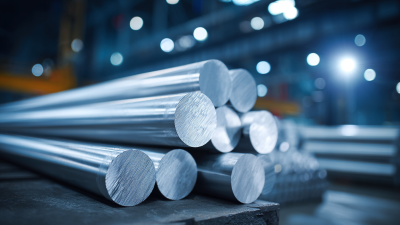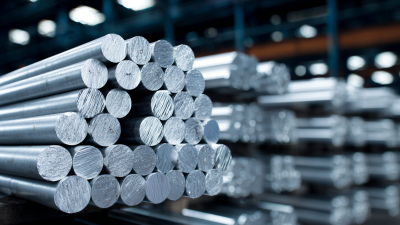Understanding the Benefits and Applications of Aluminum Sheet Metal in Modern Industries
Table of Contents
- The Versatility of Aluminum Sheet Metal Across Various Industries
- Key Advantages of Aluminum Sheet Metal: Strength, Weight, and Corrosion Resistance
- Market Trends: Growing Demand for Aluminum in Automotive and Aerospace Sectors
- Innovative Applications of Aluminum Sheet Metal in Construction and Architecture
- Cost-Effectiveness of Aluminum: A Comparison with Other Sheet Metals
- Sustainability and Recyclability: The Environmental Impact of Aluminum Usage
- FAQS
- Conclusion
- Related Posts
Aluminum sheet metal has really become an essential material in a bunch of modern industries these days. Why? Because it’s lightweight, pretty durable, and doesn’t rust easily. If you look at industry reports, you'll see that the global aluminum market is expected to hit around $189 billion by 2026. A big chunk of that demand comes from aluminum sheet metal, especially in sectors like aerospace, automotive, and marine applications. Here at Shanghai Miandi Metal Group Co., Ltd., we’re dedicated to providing a wide range of aluminum products—whether it’s the 1000 series, 8000 series, or everything in between—like plates, rods, and tubes. These materials aren’t just helping improve the performance of airplanes and ships; they’re also in line with the growing push for more sustainable manufacturing options. As industries keep evolving, the flexibility and usefulness of aluminum sheet metal will definitely keep supporting innovative designs and driving progress in engineering and tech.

The Versatility of Aluminum Sheet Metal Across Various Industries
Aluminum sheet metal is really starting to take off across different industries, and it's easy to see why. It’s super versatile and has some pretty impressive properties that make it a favorite. For example, in the automotive world, you’ll notice more and more lightweight aluminum parts being used. The goal? Making vehicles more fuel-efficient without sacrificing strength. The Aluminum Association even reports that cars with aluminum components can weigh up to 50% less — which means not just better performance, but also fewer emissions. Pretty neat, right?
In the construction and architecture scene, aluminum sheet metal is definitely a big deal thanks to its durability and corrosion resistance. The Metal Construction Association points out that roughly 70% of commercial buildings incorporate aluminum somehow — it’s like an essential building block nowadays. Plus, it’s incredibly adaptable, so architects love experimenting with different finishes and coatings to make buildings look both beautiful and functional. And let’s not forget, it lasts a long time and doesn’t need a lot of upkeep, making it a really practical choice overall.
Then there's the aerospace industry. Aluminum sheet metal is a total game-changer here because of its amazing strength-to-weight ratio. It’s pretty much a must-have when building aircraft. Research and Markets even predicts the global aerospace aluminum market could hit around $183 billion by 2025 — talk about a huge industry shift! All these trends show just how crucial aluminum sheet metal is becoming for pushing innovation and boosting efficiency across all these sectors.
Understanding the Benefits and Applications of Aluminum Sheet Metal in Modern Industries
| Industry | Application | Benefits | Typical Thickness (mm) |
|---|---|---|---|
| Automotive | Body panels | Lightweight, corrosion-resistant, enhances fuel efficiency | 0.8 - 3.0 |
| Aerospace | Aircraft skins | High strength-to-weight ratio, excellent fatigue resistance | 2.0 - 6.0 |
| Construction | Roofing and siding | Durable, weather-resistant, aesthetic appeal | 0.5 - 5.0 |
| Food Industry | Storage tanks | Non-toxic, corrosion-resistant, easy to clean | 1.0 - 4.0 |
| Electronics | Heat sinks | Excellent thermal conductivity, lightweight | 0.5 - 2.0 |
Key Advantages of Aluminum Sheet Metal: Strength, Weight, and Corrosion Resistance
Aluminum sheet metal has really become a key player across a bunch of modern industries lately. I mean, its awesome properties like being strong yet light, plus resisting corrosion, make it pretty much indispensable. Looking at the big picture, the global aluminum market is expected to keep growing. Some reports suggest it’ll hit around $850 million by 2025, and then jump to over $1.2 billion by 2033 — that’s a compound annual growth rate of about 4.3%. Basically, the demand for aluminum is only going up, especially in sectors like automotive, construction, and aerospace.
One thing I find pretty cool about aluminum sheet metal is its incredible strength-to-weight ratio. That’s a huge deal when you want stuff that’s sturdy but not heavy — like in planes and cars, where cutting down weight means better fuel efficiency and performance. Plus, aluminum’s resistance to corrosion makes it perfect for outdoor parts that face tough environmental conditions, which helps products last longer and work more reliably. As industries keep pushing for materials that are both eco-friendly and high-performing, I honestly see aluminum sheet metal playing an even bigger role down the line — it’s just too useful to ignore.
Market Trends: Growing Demand for Aluminum in Automotive and Aerospace Sectors
Lately, there's been a big uptick in how much aluminum is being used in both the auto and aerospace worlds, and it's really starting to shake up the North American aluminum scene. You know, with aluminum being so lightweight yet super strong, it's no surprise that it's becoming a go-to material in modern manufacturing. Car makers? They’re really leaning on aluminum now, mainly because it helps boost fuel efficiency and cut down on emissions — especially as tougher environmental rules keep coming up. Plus, with the shift towards electric vehicles, losing a bit of weight actually makes a huge difference in how well the batteries perform.
On the aerospace front, aluminum’s popularity keeps growing too. The industry needs materials that can handle wear and tear, resist rust, and still keep planes efficient and cost-effective. Thanks to its versatility, aluminum allows designers to get pretty creative with airplane shapes and improve overall performance. And it’s not just the sheet metal market — aluminum extrusion is also set to grow a lot over the next ten years. All in all, it’s pretty clear that aluminum is playing a key role in pushing forward innovation and sustainability across these high-tech fields.
Innovative Applications of Aluminum Sheet Metal in Construction and Architecture
Aluminum sheet metal has really become a game-changer in the world of construction and architecture. You know, thanks to it being lightweight, super durable, and so versatile in looks. I came across a report from the Aluminum Association, and it’s pretty impressive—aluminum usage in building projects has shot up by over 30% in just the past five years. That’s a clear sign it's becoming more and more essential in the industry. Architects love how aluminum sheets give a sleek, modern vibe, whether it’s for facades, roofing, or even interior accents. Plus, they resist corrosion like a champ, so structures stay looking great and intact longer, which means less maintenance hassle and cost in the long run.
If you're thinking about using aluminum sheets for your project, a good tip is to go for pre-finished options—saves a ton of time and cuts down on waste. And if energy efficiency matters to you, try placing some thermal insulation behind the aluminum cladding—that can really make a difference.
What’s also pretty cool is how versatile aluminum is beyond just the usual stuff. Architects are using it to craft all sorts of complex curves and intricate shapes, especially in modern buildings. And here’s some exciting news: a recent market analysis suggests that demand for aluminum composites and panels is expected to grow by around 5% each year, which means more innovation in eco-friendly and sustainable building designs. This is part of a bigger push to boost energy efficiency and cut down on carbon footprints in construction.
One more thing worth mentioning—always think about the environmental impact when choosing your materials. The good news is, aluminum is 100% recyclable, making it a smart and eco-conscious choice if you’re aiming for sustainable building practices.

Cost-Effectiveness of Aluminum: A Comparison with Other Sheet Metals
When you compare the cost-effectiveness of aluminum sheet metal to materials like steel or copper, aluminum often turns out to be the smarter, more budget-friendly choice for a bunch of different projects. One of the main reasons is its lighter weight—this doesn’t just cut down on transportation expenses, but also makes handling and installing it way easier. Plus, aluminum is a breeze to machine and versatile enough to fit into lots of applications. That means less time spent on manufacturing and lower labor costs, which is why industries like automotive and aerospace love working with it.
On top of that, aluminum is pretty resistant to rust and corrosion, and it keeps its strength over time. This basically translates into lower ongoing maintenance costs compared to other metals. Sure, the initial price tag might be similar to steel or copper, but when you factor in savings on upkeep, energy efficiency, and recycling, aluminum starts to look like a real bargain in the long run. All these benefits, combined with its other good properties, really convince many industries to choose aluminum sheet metal as their go-to material for production. It’s got that winning combo of affordability and practicality that’s hard to beat.
Sustainability and Recyclability: The Environmental Impact of Aluminum Usage
Aluminum has really become a key player in so many industries these days. And honestly, a big reason for that is how eco-friendly and easy it is to recycle. The cool thing? Aluminum can be recycled over and over without losing its strength or quality. Plus, recycling aluminum takes just about 5% of the energy you'd need to make new aluminum from scratch. That’s a huge energy saver and helps slash carbon emissions. No wonder so many businesses that care about the environment are choosing it!
These days, you’ll see aluminum sheet metal everywhere—think cars, airplanes, even building stuff. It’s lightweight but super tough, which is exactly what you want. The whole idea of a circular economy with aluminum is all about thinking long-term, like reusing and recycling to cut down on waste and keep things sustainable. By using aluminum wisely, companies aren’t just ticking boxes for regulations; they’re also connecting with customers who really care about the planet. Basically, using aluminum helps grow the economy while still being kind to our Earth. It’s a win-win, don’t you think?

FAQS
: Aluminum sheet metal is gaining traction in various industries, including automotive, construction, and aerospace, due to its remarkable versatility and advantageous properties.
In the automotive sector, lightweight aluminum components enhance fuel efficiency while maintaining structural integrity, potentially reducing vehicle weight by up to 50%.
Aluminum sheet metal is favored in construction due to its durability, resistance to corrosion, aesthetic adaptability, long lifespan, and low maintenance requirements.
Aluminum's high strength-to-weight ratio is crucial in aerospace applications, making it indispensable for aircraft manufacturing and contributing to enhanced performance.
The global aluminum market is expected to grow, reaching approximately $850.41 million by 2025 and continuing to expand towards $1,200.82 million by 2033.
Aluminum's superior corrosion resistance makes it an ideal choice for components exposed to challenging environmental conditions, thus enhancing longevity and reliability.
Stricter environmental regulations in the automotive industry drive the demand for aluminum as manufacturers seek to enhance fuel efficiency and reduce emissions.
The growing need for durable and versatile materials in the aerospace industry, alongside innovative designs, is leading to significant growth in the aluminum extrusion market.
The trend towards electric vehicles emphasizes weight reduction, making aluminum's lightweight nature critical for improving battery performance.
As industries innovate and seek sustainable materials that offer performance, aluminum sheet metal is poised to play a central role in future advancements.
Conclusion
Aluminum sheet metal has really become a staple in today’s industries. It’s pretty amazing how versatile it is—found everywhere from cars and airplanes to buildings. One of the big reasons it’s so popular is because it’s super strong yet lightweight, plus it won’t rust easily. That combination makes it a top pick in automotive, aerospace, and construction projects. More and more, companies are turning to aluminum because it performs well and is eco-friendly, fitting right into the trend of seeking sustainable materials that won’t harm the environment.
And let’s not forget, aluminum sheet metal is also budget-friendly compared to some other options out there. There’s a huge variety—think sheets, plates, tubes—and companies like Shanghai Miandi Metal Group Co., Ltd. are working hard to keep up with the demand, providing high-quality aluminum for everything from planes and ships to modern architecture. Its adaptability is pretty impressive too, making it a go-to material for all kinds of innovative projects in today’s manufacturing and construction worlds.
Related Posts
-

What Makes 6063 Aluminum Alloy Plates the Preferred Choice in Modern Manufacturing?
-

Global Market Analysis 2025 for Best Weldable Aluminum Alloy and How to Choose the Right Supplier
-

Top Strategies for Sourcing Affordable 6061 T6 Aluminum in the Global Market
-

Exploring the Growth of 5083 Aluminum Plate Suppliers at the 2025 China Import and Export Fair
-

7 Reasons Why 6061 Aluminum Forgings Are the Future of Sustainable Manufacturing
-

Exploring the Versatility and Strength of 5083 Aluminum Sheet in Modern Industries
Blog Tags:

